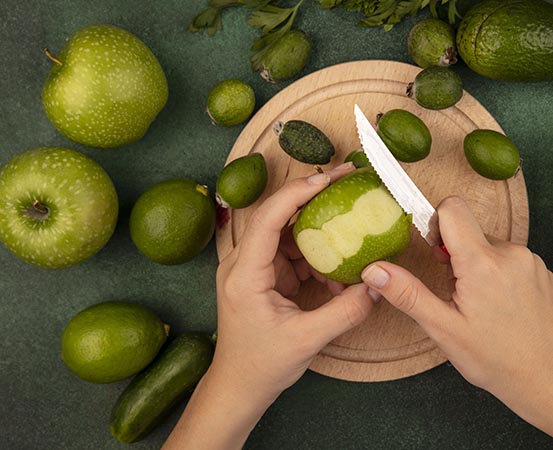
Maintaining proper functioning of the kidneys means filling your platter with kidney-friendly food items. However, given the constraints, choosing a kidney-friendly diet could be challenging for those with renal disorders.
According to Dr Eileen Canday, HoD, Nutrition & Dietetics at Sir HN Reliance Foundation Hospital and Research Centre, “The diet depends on the type of kidney complication. There are customised diets for different complications including kidney stones, chronic kidney disease, acute renal failure and more.”
Kidney-friendly diet: Things to look out for
Experts provide a checklist that people must follow while choosing an appropriate kidney-friendly diet:
♦ Ensure hydration, but say no to cola
Adequate hydration is essential for the kidneys, which ensures that your urine doesn’t contain high levels of ammonia, creatinine, sodium or calcium, explains N Vijayashree, head & chief dietitian, MGM Healthcare, Chennai. Dark urine indicates dehydration, making it difficult for the kidneys to excrete these minerals. “This leads to fatigue and exhaustion, as the kidneys get inflamed,” she said.
Water consumption varies with the type of kidney complication, and the appropriate amount should be recommended by doctors. The water intake for people undergoing kidney transplant will be different from those on dialysis (1 litre per day), says Dr Canday.
Homemade juices (without sugar or salt), lemon water or buttermilk are good for hydration. “However, sodium-rich processed beverages like sodas and colas must be avoided at all costs,” says Dr Sundar Sankaran, director, Aster Institute of Renal Transplantation, Aster Whitefield Hospital, Bengaluru.
♦ High sodium foods are a big No
Maintaining kidney health requires avoiding foods high in sodium and potassium. ” The kidneys filter out the toxins along with urine, thereby purifying the blood and maintaining an optimal level of fluid and electrolytes within our body,” says Dr Sankaran. “Thus, consuming foods with high salt content will result in sodium retention, causing the kidneys to have reduced function and remove less water.” This will eventually lead to hypertension.
While preparing Indian meals (which are mostly salty), Dr Sankaran advises to be mindful of how much salt is being added to the food. “Human beings don’t require more than 2-4 grams of salt every day, but we take about a minimum of 8-16 grams. More salt leads to increased hypertension and other health problems,” he stresses.
Sodium additives and preservatives found in processed foods are also unhealthy, and people with kidney complications must take caution. “Checking the labels of the food products is a must to choose food items with very less sodium or sodium additives like baking soda or powder,” explains Dr Canday.
♦ Potassium levels should be under control
A high potassium level is also a concern for people with kidney complications. When kidneys fail, potassium in the blood cannot be filtered out, which is dangerous. “Potassium level above 7 mEq/L is considered to be dangerous and can even cause a stroke,” says Dr Sankaran.
“For instance, people with chronic kidney disease (CKD) should not consume tender coconut water. While it is helpful for a person with kidney stones, it is not recommended otherwise due to its high potassium content,” he adds.
Vijayashree explains that incorporating fruits and vegetables in your diet is a must. “The fruits and vegetables you choose must be rich in antioxidants. You can have four to five servings of fruits every day,” she says.
Dr Sankaran further adds that people with healthy kidneys can have citrus fruits, juices, bananas, berries, apples and avocados. “However, those with failing kidneys must avoid these potassium-rich fruits,” he adds.
♦ Protein consumption is vital
According to Dr Canday, the amount of protein intake will depend on the type of kidney complication. “For instance, a person with CKD who’s on dialysis will be advised to consume a high-protein diet.”
However, Dr Sankaran points out that many people have misconceptions about protein and kidney complications. In his view, Western diets restrict high protein intake. “Unless you are working out, don’t consume more than 60 grams of protein per day. The Indian diet needs protein to prevent the body from breaking down. Vegetarian proteins are allowed. Sambar (South Indian lentil vegetable stew) and rasam (soupy dish) can be consumed. Even eggs are recommended,” he says.
♦ Red meat is fine, but not processed fat
When asked if consuming red meat is okay, Dr Canday says, “As long as it is red lean meat without the fat and sodium-based salt, it is okay to consume them in moderation with a dietician’s recommendation.” For people with CKD, 50-70 grams of lean meat is advisable.
Fats found in poultry should be avoided, says Dr Anil Kumar B T, HOD, Sr consultant nephrologist & chief transplant physician, BGS Gleneagles Global Hospitals, Bengaluru. “Red meat, such as beef, mutton and pork contain saturated fatty acids that are good for the kidneys,” he says. As fats prevent kidney damage and inflammation, they must not be completely avoided. “However, excessive fat consumption is not recommended,” he adds.
Takeaways
- People with kidney issues should choose their diet based on the type of complication.
- Excessive consumption of sodium and potassium can lead to kidney failure.
- Proteins, saturated fats, antioxidants and adequate hydration are essential for proper functioning of the kidneys.

















